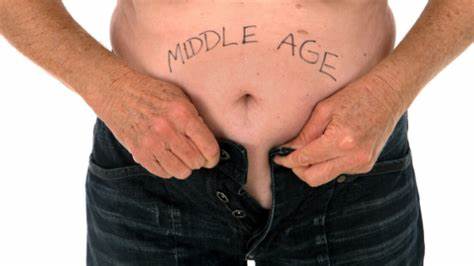Is the so-called (an accepted) Middle Age Spread actually a thing?
September 14, 2022

You’ve likely heard the commonly used reason for gaining weight in our thirties, forties, and beyond—the phenomenon known as the middle age spread.
And this commonly used reason? When we hit middle age, our metabolism slows down, resulting in weight gain.
Yes, this is correct. The main excuse behind the middle age spread is the so-called slowing of our metabolism.
I am sure you’ve heard this, gaining weight in middle age has become somewhat accepted and expected and nearly exclusively blamed on our metabolism changes.
Not sure if you have heard this? I’m sure you have; think of just about any man or woman aged 30-60 who has put on some kilos, and you’ll recall hearing something like, “I cannot eat like I used to. When I was in my 20s, I could eat anything I liked without putting any weight on. These days though, all I have to do is look at food, and I put weight on.” This statement is blaming our metabolism; as I said, it has become the go-to excuse for middle-aged weight gain.
Is this true, though? A study spanning four decades and involving nearly 6500 participants from age 9 to 95 changes what we believe to be true with human metabolism. The results debunk the notion that once we hit our thirties, our metabolism goes to shit.
In fact, our metabolism remains consistent all the way until our 60’s. There is no significant difference between your metabolism at age 20 compared to age 30, 40, or 50.
John Speakman (Ph.D. of University of Aberdeen), one of the study’s co-authors, stated, “Perhaps the most unexpected feature was the constancy of metabolic rate in both males and females between the ages of 20 and 60.”
If this is all true, why is middle-aged spread such a common and accepted thing?
It is a pretty simple answer; middle age spread results from eating more and moving less. The blame shouldn’t lay with your metabolism; the blame is squarely on your habits…habits around how you eat and move. If you are experiencing the middle age spread, stop and really consider what you did in your teenage years and early twenties, in regards to movement and eating (drinking). It will probably be a vast contrast to what you are doing now.
Your answer to stop the middle age spread. Eat Better and Move more.
Share This Story, Choose Your Platform!
Is the so-called (an accepted) Middle Age Spread actually a thing?
September 14, 2022

You’ve likely heard the commonly used reason for gaining weight in our thirties, forties, and beyond—the phenomenon known as the middle age spread.
And this commonly used reason? When we hit middle age, our metabolism slows down, resulting in weight gain.
Yes, this is correct. The main excuse behind the middle age spread is the so-called slowing of our metabolism.
I am sure you’ve heard this, gaining weight in middle age has become somewhat accepted and expected and nearly exclusively blamed on our metabolism changes.
Not sure if you have heard this? I’m sure you have; think of just about any man or woman aged 30-60 who has put on some kilos, and you’ll recall hearing something like, “I cannot eat like I used to. When I was in my 20s, I could eat anything I liked without putting any weight on. These days though, all I have to do is look at food, and I put weight on.” This statement is blaming our metabolism; as I said, it has become the go-to excuse for middle-aged weight gain.
Is this true, though? A study spanning four decades and involving nearly 6500 participants from age 9 to 95 changes what we believe to be true with human metabolism. The results debunk the notion that once we hit our thirties, our metabolism goes to shit.
In fact, our metabolism remains consistent all the way until our 60’s. There is no significant difference between your metabolism at age 20 compared to age 30, 40, or 50.
John Speakman (Ph.D. of University of Aberdeen), one of the study’s co-authors, stated, “Perhaps the most unexpected feature was the constancy of metabolic rate in both males and females between the ages of 20 and 60.”
If this is all true, why is middle-aged spread such a common and accepted thing?
It is a pretty simple answer; middle age spread results from eating more and moving less. The blame shouldn’t lay with your metabolism; the blame is squarely on your habits…habits around how you eat and move. If you are experiencing the middle age spread, stop and really consider what you did in your teenage years and early twenties, in regards to movement and eating (drinking). It will probably be a vast contrast to what you are doing now.


